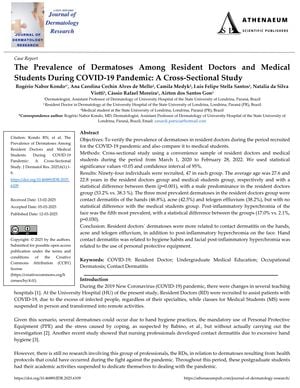The Prevalence of Dermatoses Among Resident Doctors and Medical Students During COVID-19 Pandemic: A Cross-Sectional Study
March 2025

TLDR Resident doctors had more facial skin discoloration than medical students during COVID-19.
The study examined 94 individuals, equally divided between resident doctors and medical students, to assess the prevalence of dermatoses during the COVID-19 pandemic. Resident doctors exhibited higher rates of contact dermatitis, acne, and telogen effluvium, although these were not statistically significant compared to medical students. However, post-inflammatory hyperchromia of the face was significantly more common in resident doctors (17.0% vs. 2.1%, p=0.030). The findings suggest that these skin conditions are associated with hygiene practices and the use of personal protective equipment. The study's limitations include a small sample size and potential biases, indicating a need for further research.







